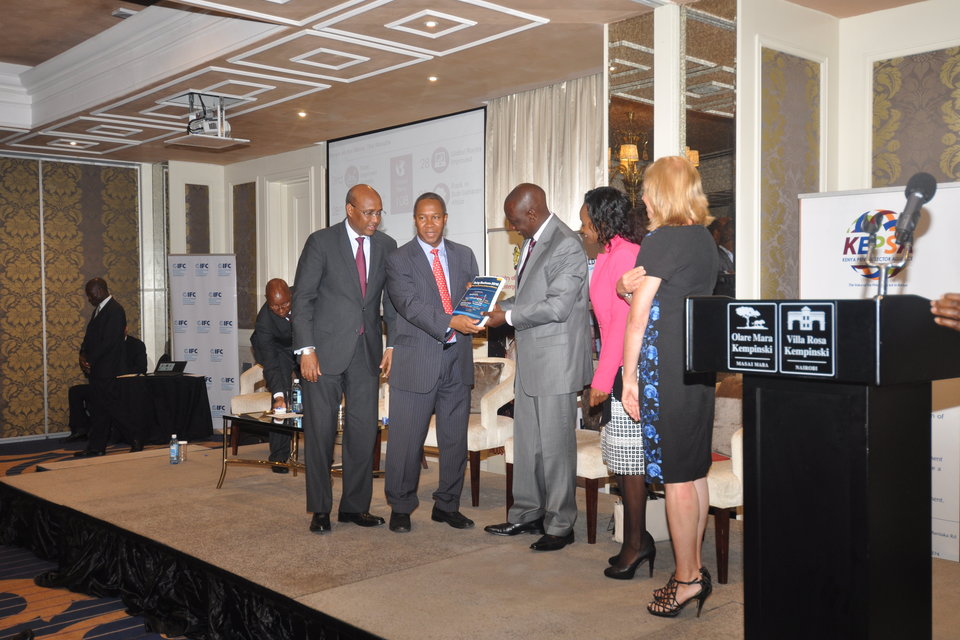Launch of World Bank's Ease of Doing Business 2016 report
Remarks by Head of DFID-Kenya, Lisa Phillips, on 28th October

On behalf of the British Government, I congratulate the Kenyan Government on the progress it has made this year to qualify as one of the global top ten reformers on the ease of doing business. The progress that Kenya is making against the Ease of Doing Business indicators may seem very remote from the lives of ordinary Kenyan businesses and households, but is actually very significant for three reasons.
Firstly, it can result in increased domestic investment and jobs. Lets take the progress Kenya has made in cutting all the red tape around starting a business, which is one of the reforms that the World Bank has recognised. In Mombasa this has brought the time down to get a Business License from 7 days to less than 1 hour, using an online platform.
Evidence suggests that this can have a number of benefits: It increases the number of firms entering a market, which increases competition and productivity; it can also incentivize businesses to formalize, since the high costs of doing so are a major reason why Kenya has so many informal firms. This can then give them better access to finance and the opportunity to grow and create more jobs; and as more firms register for businesses, county governments also benefit from increased revenue. The Business permit is already the third most important source for revenue for Mombasa County.
So one survey of the global evidence found that a reduction in the time to start a business by a similar amount to Mombasa, is associated with a 0.3 percentage point increase in the investment rate and a 0.36 percent increase in the GDP growth rate. If this reform can be spread throughout Kenya it can therefore add up to a lot of jobs for ordinary Kenyans.
Secondly, it can result in increased foreign investment in Kenya. This is because being rated as a top ten reformer signals to investors that Kenya is genuinely open for business. Of course, if it causes investors to look into Kenya, all the other conditions also have to be met for the investment to take place, so it is just creating an opportunity which the Government needs to seize.
And finally, these reforms are positive sign of the Government’s commitment to fight corruption. This is because the use of electronic and streamlined regulatory processes significantly cut the opportunity for corruption.
However, although celebrating success is important, we should also not rest on our laurels. The last time that Kenya was a top ten reformer was in 2008, when it had a Doing Business ranking of 78. Because of other countries then making progress faster than Kenya, we then dropped rapidly.
The message then is this: in our globalized world, in order to attract investment Governments have to keep on innovating and improving the business environment. This will require further institutionalization and empowerment of the Doing Business Unit in the Ministry of Industrialisation, so that it can continue to drive reforms throughout government.
I would like to end by stating that the British Government remains committed to helping the Government of Kenya continue with this work, and to briefly outline what we are doing to help the Kenyan economy. The UK is a major development partner on economic development in Kenya, and is helping to achieve the Vision 2030 goal of becoming a middle income country with prosperity for all.
But because we prefer to provide support behind-the-scenes, many are not aware of all that we are doing and so I would like to very briefly take this opportunity to share some of the activities.
On the investment climate, we are the largest donor to the World Bank in its support to the Government on this, which has contributed to the success we are celebrating today.
On access to finance, although we are most well-known for our support which started M-Pesa, more recently, through the Financial Sector Deepening Trust we have helped CBA develop MShwari. To date MShawari has lent 24 billion shillings in small business loans, and has turned CBA into the biggest bank in East Africa by loan volumes, almost overnight.
On access to electricity, we are supporting a Kenyan company – MKOPA – which has enabled nearly 250,000 households to access modern solar technology to charge a phone and light their homes.
Our investment business CDC, invests in more than 100 business in Kenya ranging from Brookside Dairy to the new Garden City.
We are the largest donor to Trademark East Africa who are working closely with the Government in bringing down the time it takes to import and export.
And our Kuza programme is working with the most vulnerable youth on the coast to ensure that they are able to secure work.
Ultimately we want Kenya to put us out of a job as a development partner, and if the Government continues with the reforms we are discussing today, we are definitely on the right track.